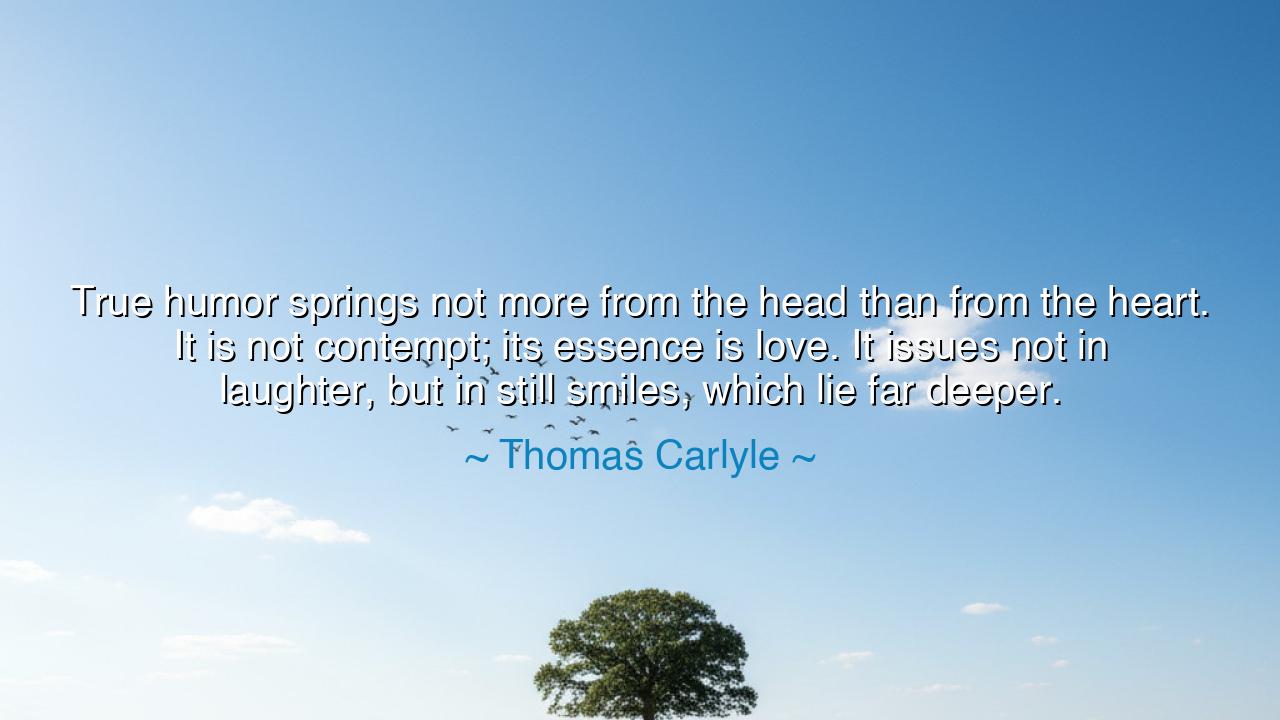
True humor springs not more from the head than from the heart. It
True humor springs not more from the head than from the heart. It is not contempt; its essence is love. It issues not in laughter, but in still smiles, which lie far deeper.






"True humor springs not more from the head than from the heart. It is not contempt; its essence is love. It issues not in laughter, but in still smiles, which lie far deeper." These words from Thomas Carlyle speak to the very soul of humor. In a world where humor is often seen as merely a vehicle for mockery or entertainment, Carlyle’s wisdom calls us to understand that true humor does not arise from the intellect alone, nor is it a weapon to wound or ridicule. Rather, it emanates from the heart, from a deep place of compassion and love for the human experience. True humor, as Carlyle suggests, is gentle, rooted not in contempt but in the shared joy and vulnerability of life. It does not seek to belittle, but to unite, and its essence lies in the quiet smile, the subtle expression of understanding, that speaks far deeper than the loudness of laughter.
In the ancient world, humor was often regarded as a reflection of the spirit. Plato, in his dialogues, recognized the connection between humor and wisdom, noting that those who could laugh at life’s absurdities with grace and understanding were the ones closest to true enlightenment. He did not view humor as something that diminished the intellect but as a means of engaging with the complexities of life in a way that did not diminish its dignity. True humor, as Plato might say, arises not from the mind’s desire to dominate or control but from the heart’s deep acceptance of life as it is. Carlyle echoes this ancient truth, revealing that humor, at its core, comes from love—a love that recognizes our flaws, our shared struggles, and the beauty of being human.
Consider the story of Socrates, who often used humor to challenge his fellow Athenians not with derision, but with the gentle probing of their own beliefs. His humor was not contemptuous but deeply empathetic, a tool for revealing truth and understanding. When Socrates questioned his interlocutors, he did so with a sharp wit that made them laugh, but never at their expense. His humor was always rooted in a desire to enlighten and to bring forth a greater understanding. The deep, humble smiles that emerged from these dialogues were not signs of mockery but of recognition—that the truth is not something to be feared, but something to be embraced. Carlyle’s words capture this essence of humor—a humor that arises from a place of kindness and wisdom, not one that seeks to hurt or dominate.
In the context of love, humor is often a bridge that connects two souls. Take the example of Marcus Aurelius, the Stoic emperor, who, despite his vast power, understood the importance of humility and connection with others. His humor, though subtle and often introspective, was rooted in a profound acceptance of life’s impermanence. Aurelius laughed not at the world, but at the absurdities of human nature—recognizing that all people, including himself, are part of a shared journey. This kind of humor is not loud or performative but quiet, deep, and filled with affection for the human condition. It lies in smiles, not laughter, in the way we see the beauty and fragility of life and are able to respond with gentleness rather than scorn.
Similarly, Confucius, the great philosopher of ancient China, saw humor as an essential part of a wise and virtuous life. He taught that one should approach life with a balance of seriousness and levity—understanding the gravity of human existence, but also recognizing that humor could ease the burden of life’s hardships. True humor, for Confucius, was rooted in compassion—in the ability to laugh with others, not at them, and in the capacity to find joy in the shared human experience. Carlyle, like Confucius, understands that humor, when it is truly authentic, connects us not by belittling others, but by raising us up together in our shared vulnerability and humanity.
The lesson that Carlyle imparts is one that is often lost in our modern world, where humor is too frequently used as a weapon of division or superiority. True humor, as he explains, comes from a place of love—it is the gentle smile that reflects a shared understanding of life’s imperfections and joys. It does not seek to dominate or degrade, but to celebrate and connect. Humor that comes from the heart, that is free from contempt, has the power to heal, to bring people together, and to create spaces where people can feel safe to be themselves without fear of judgment or ridicule.
So, dear listener, take this wisdom and carry it with you into the world. Let your humor come from a place of kindness and compassion, not from the desire to dominate or belittle. Laugh at life’s absurdities, not with the scorn of superiority, but with the gentle understanding that we are all part of this shared journey. Allow your humor to be the glue that connects you with others, the smile that lifts rather than lowers, and the laugh that speaks of a heart willing to accept and celebrate the beautiful imperfections of the human experience. In this, you will find the true power of humor—not as a weapon, but as a bridge to a more connected, authentic life.






AAdministratorAdministrator
Welcome, honored guests. Please leave a comment, we will respond soon